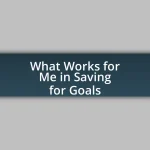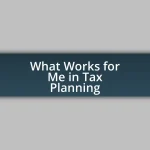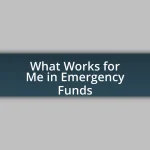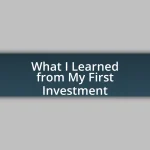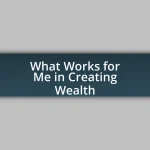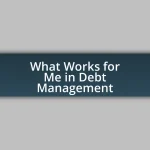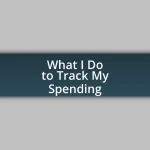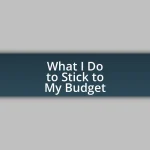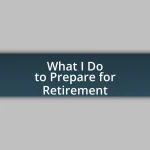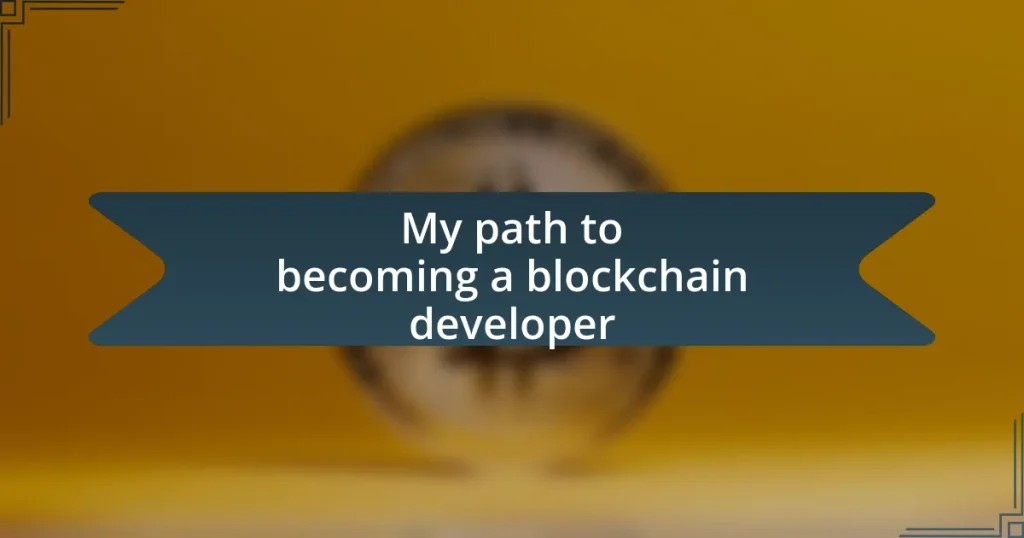Key takeaways:
- Blockchain technology is a decentralized ledger that offers immutability and integrity through consensus mechanisms.
- Choosing the right programming languages, such as Solidity for Ethereum and JavaScript for network interactions, is critical for blockchain development.
- Hands-on projects and building a strong portfolio showcase skills and reflect personal growth in the blockchain field.
- Networking within the blockchain community and continuous learning are essential for professional development and staying informed about industry trends.
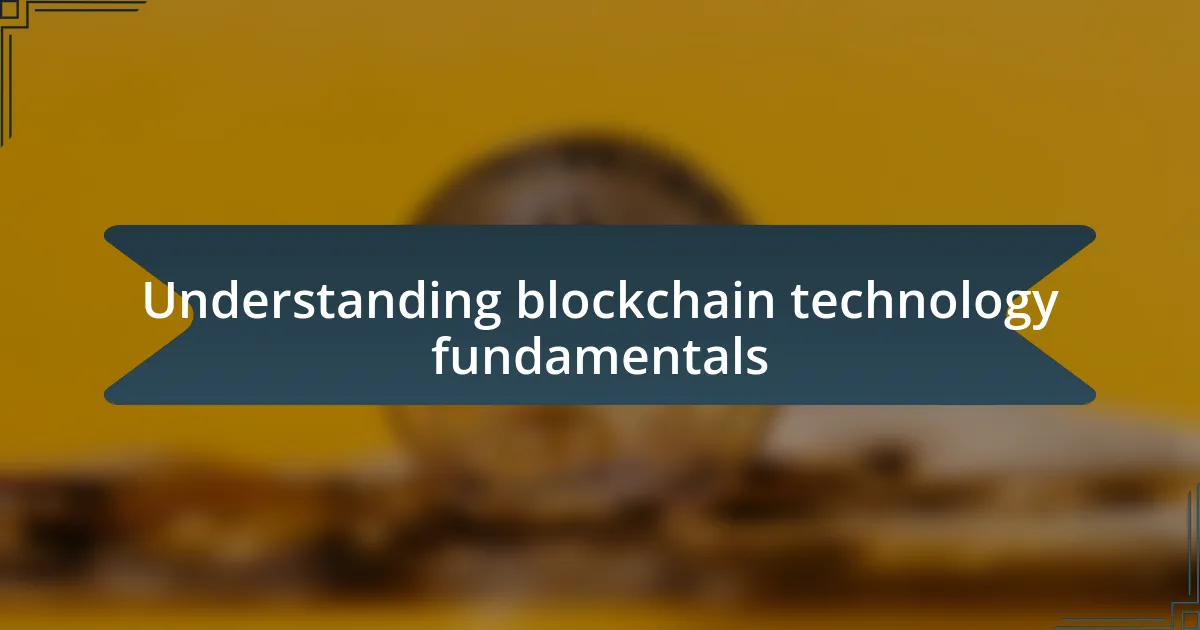
Understanding blockchain technology fundamentals
Blockchain technology can seem overwhelming at first, but breaking it down into its core components helps a lot. When I first encountered it, I was amazed to discover that it’s essentially a decentralized ledger that records transactions across multiple computers. This means no single entity owns the data, which is a fundamental shift in how we think about trust and security.
One aspect that truly captivated me was the concept of immutability. Once a transaction is recorded on the blockchain, altering it becomes nearly impossible. Can you imagine how powerful that is? For someone like me, who has seen the impact of data tampering in various industries, this quality of blockchain felt like a breath of fresh air. It opens up possibilities for creating more secure systems, especially in areas that require transparency, like finance or healthcare.
Another critical component of blockchain is consensus mechanisms, which ensure that all participants in the network agree on the validity of transactions. I remember grappling with this concept initially, but eventually, I realized it’s what gives blockchain its integrity. It raises a fascinating question: How do we build consensus in a world that often seems polarized? Understanding these fundamentals not only deepens your knowledge but also shapes how you envision applying blockchain technology in practical scenarios.
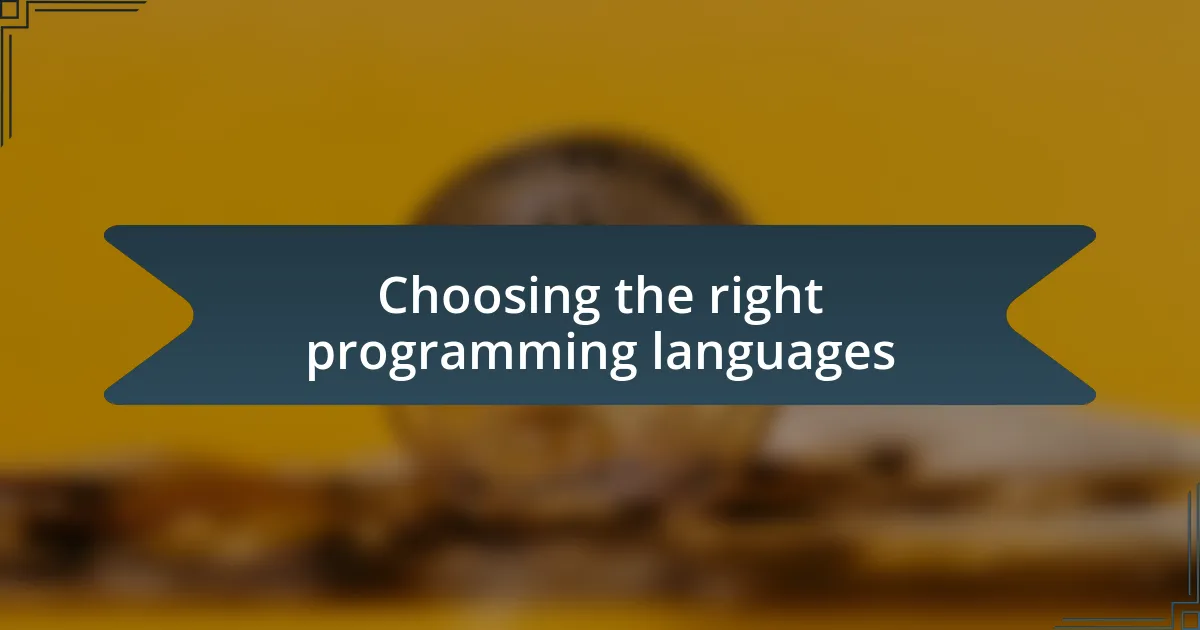
Choosing the right programming languages
Choosing the right programming languages for blockchain development can feel daunting, but it significantly influences your path. During my journey, I found that languages like Solidity were essential for developing smart contracts on Ethereum. Realizing this helped me narrow down my focus and dedicate time to mastering the specific languages that could make my ideas come to life.
On the other hand, understanding the broader landscape of programming languages is equally important. For instance, I had initially overlooked languages like JavaScript in my early days, thinking it was only for web development. However, when I learned that frameworks like Node.js can interact with blockchain networks, I instantly recognized its value. It was enlightening to experience how a shift in perspective could expand my toolkit.
Lastly, it’s worth considering the community and resources surrounding each programming language. When I started learning Go for Hyperledger Fabric, being part of a supportive community made a huge difference. I often turned to forums and online groups where developers shared insights and challenges. This collaborative environment not only accelerated my learning but also sparked excitement as I began to build real-world applications.
| Programming Language | Key Use Case |
|---|---|
| Solidity | Smart contracts on Ethereum |
| JavaScript | Network interactions with frameworks like Node.js |
| Go | Building applications on Hyperledger Fabric |
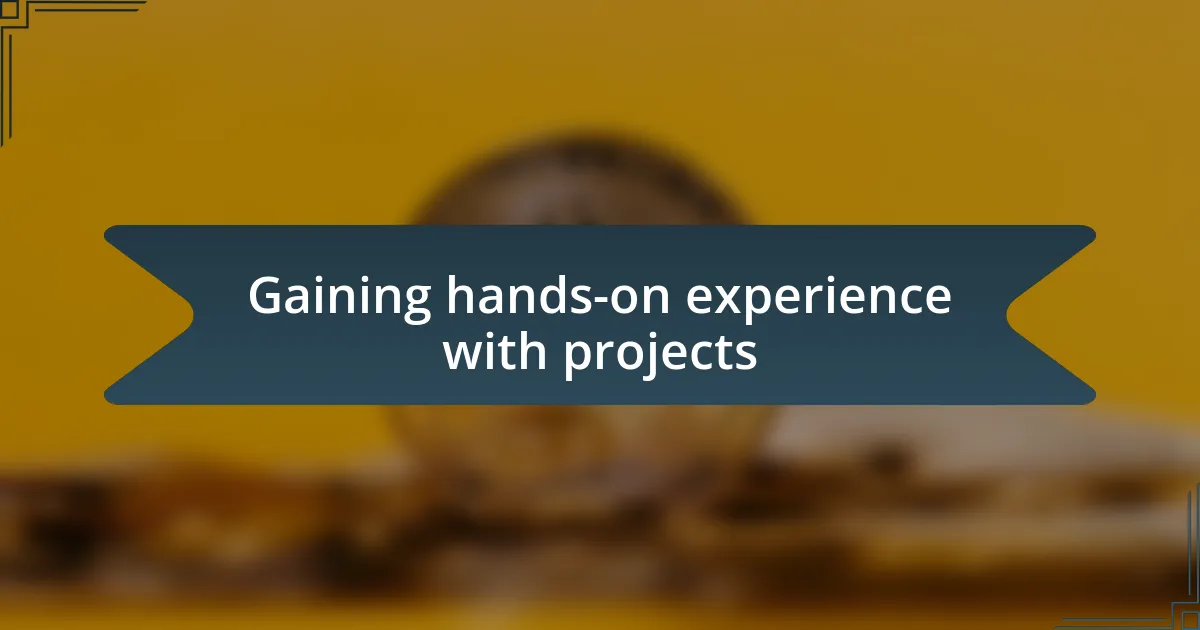
Gaining hands-on experience with projects
Gaining hands-on experience is the bridge between theory and practice in blockchain development. I remember the first time I worked on a personal project; the excitement was palpable. I decided to create a simple decentralized application (dApp) and, despite the initial challenges, every setback transformed into a learning opportunity. Diving into real projects not only solidified my coding skills but also revealed the intricacies of blockchain protocols that theoretical knowledge couldn’t convey.
To truly enhance your skills through projects, consider the following approaches:
- Start Small: Develop simple applications, like a to-do list or a basic token creation.
- Contribute to Open Source: Engaging with existing projects on platforms like GitHub allows you to learn from experienced developers while giving back to the community.
- Collaborate with Peers: Join hackathons or local meetups where you can work alongside others, which often leads to unexpected insights and skills.
- Build in Different Environments: Experiment with various blockchain platforms, like Ethereum, Binance Smart Chain, or Hyperledger, to gain diverse experiences.
- Document Your Process: Keep a development journal. Reflecting on your journey can help you identify growth areas and streamline learning.
Through these experiences, I not only cultivated my technical abilities but also discovered my passion for solving real-world problems with blockchain solutions.
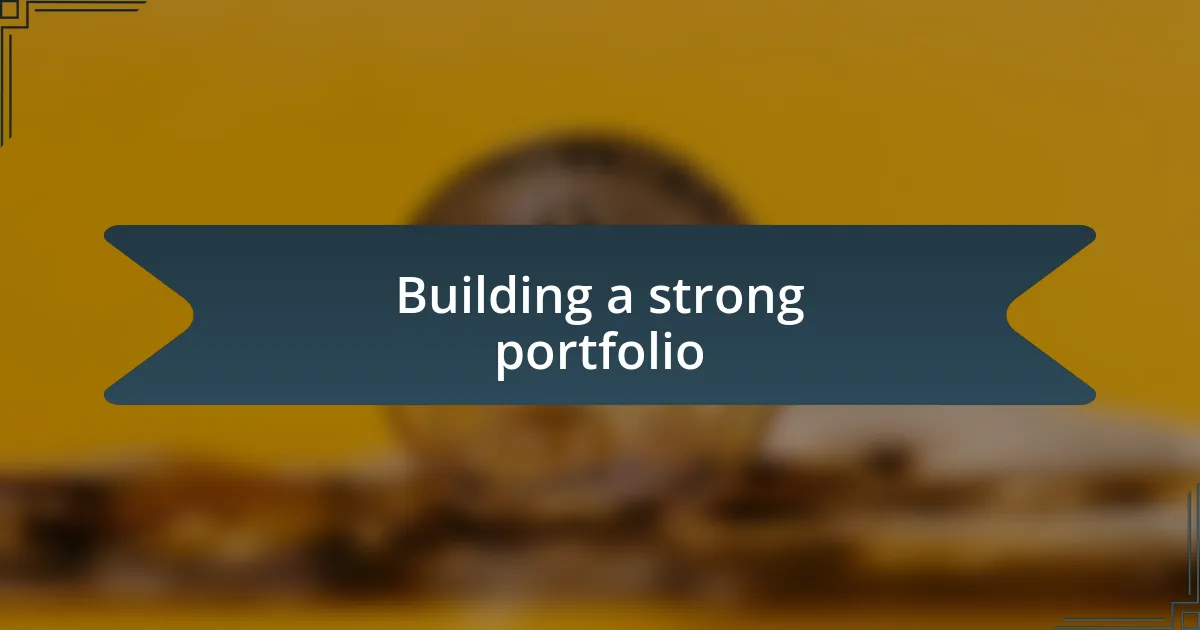
Building a strong portfolio
Building a strong portfolio is crucial for showcasing your skills and attracting potential employers. When I began compiling my projects, I realized that each piece told a unique story of my growth. Every app I built, every bug I fixed—it all felt like a chapter in a journey that was entirely my own. Are you thinking about what to include in your portfolio? Choose projects that not only highlight your technical prowess but also reflect your personal interests and problem-solving capabilities.
As I curated my portfolio, I found it vital to provide context for each project. For instance, when I showcased an NFT marketplace I developed, I explained the challenges I faced, such as integrating smart contracts and ensuring a user-friendly interface. This narrative not only engaged viewers but also demonstrated my thought process and adaptability. Have you shared the journey behind your projects? Your portfolio should let potential employers understand not just what you did, but how you approached the challenges along the way.
Lastly, don’t underestimate the power of presentation. A clean, well-organized portfolio can make a strong first impression. I learned this the hard way after receiving feedback that my initial layout was cluttered and confusing. Simplifying my design, highlighting my most impactful projects, and clearly articulating my roles made a world of difference. What do you want your portfolio to say about you? Aim for clarity and professionalism—it’s the subtle details that can persuade someone that you are the right fit for their team.
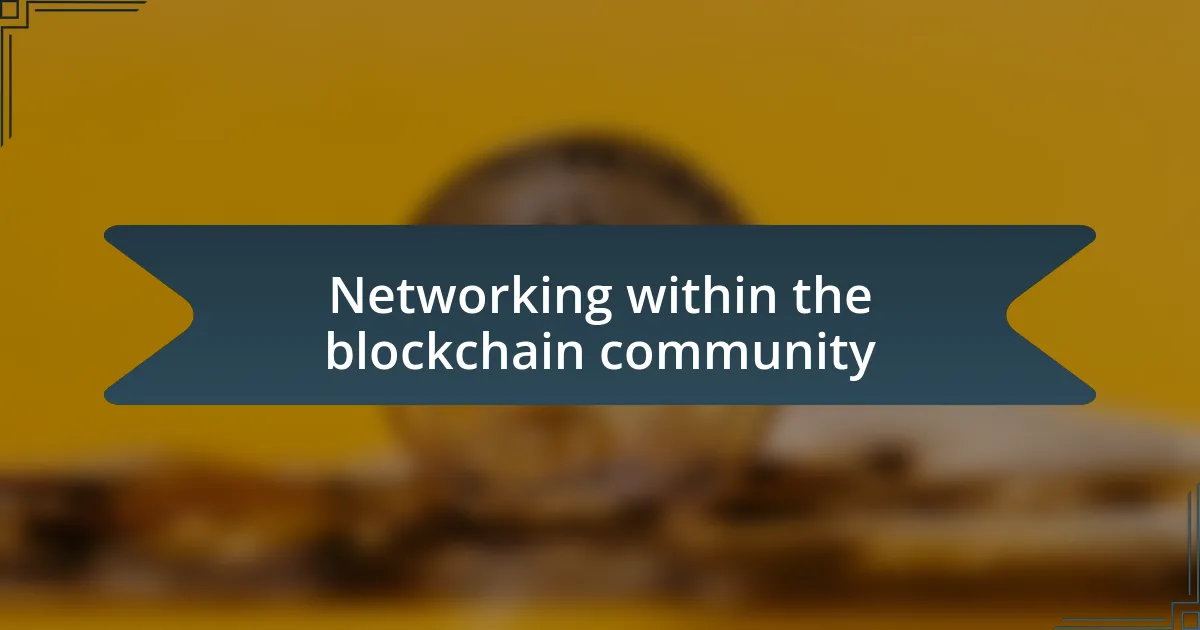
Networking within the blockchain community
One of the best decisions I made in my journey was actively engaging with the blockchain community. Attending local meetups ignited my passion; meeting people who were just as enthusiastic about blockchain technology validated my interest. Have you ever felt that thrill of connection, surrounded by like-minded individuals? It opens up opportunities and encourages collaboration in ways that online forums simply can’t replicate.
As I networked, I discovered that sharing knowledge is a cornerstone of this community. I remember the first time I explained a complex concept to someone at a workshop. Watching their eyes light up with understanding was rewarding; it reminded me that networking is not just about personal gain but also about lifting others as we climb. How can you share your expertise with others? Consider offering to mentor someone or present your findings at community events.
Utilizing online platforms like LinkedIn and Twitter has also proven invaluable for me. These spaces are buzzing with blockchain discussions and job opportunities. I once landed a freelance project after sharing insights about a recent trend I spotted in the market. It’s incredible how initiating discussions online can lead to real-world opportunities. Are you leveraging social media to expand your network? Engaging with the community online can complement your face-to-face interactions and broaden your horizons.
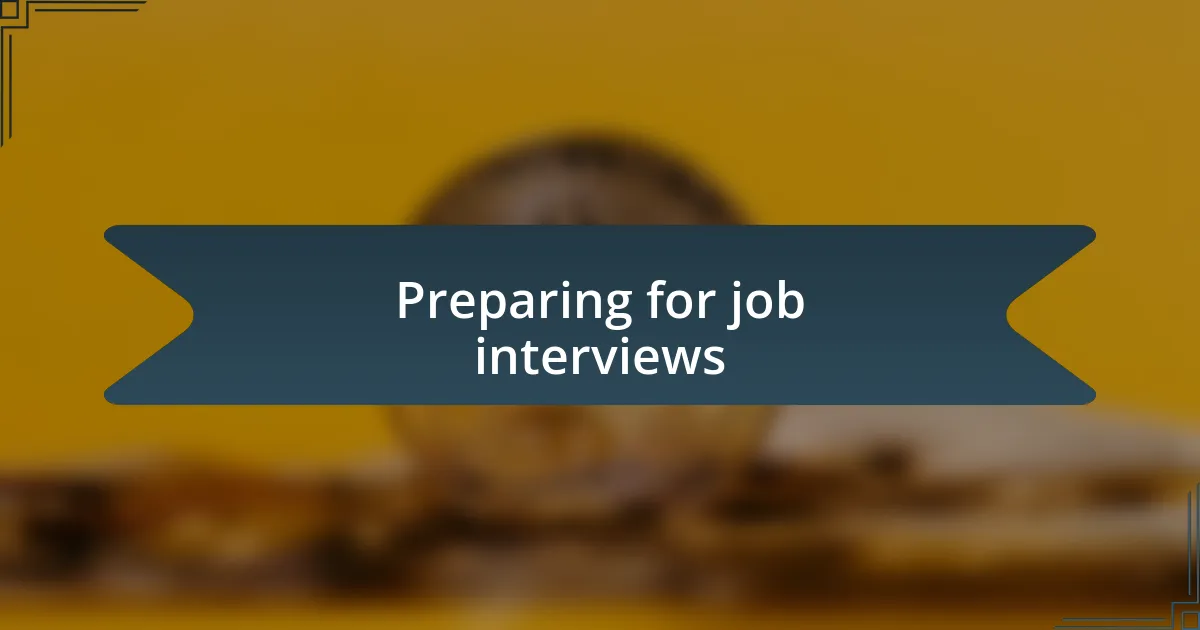
Preparing for job interviews
Preparing for job interviews can be an intense experience, especially in the fast-paced world of blockchain. I distinctly remember preparing for my first interview; the night before, I laid out my notes on popular blockchain platforms and projects. I found that going through specific projects I had worked on not only helped me articulate my experience but also boosted my confidence.
One crucial aspect I learned is the importance of practicing common interview questions related to blockchain. I often created mock interviews with a friend, simulating typical inquiries like “What is a smart contract?” or “Can you explain the differences between public and private blockchains?” It felt awkward at first, but each practice run eased my nerves and polished my responses. Have you ever tried rehearsing out loud instead of just reading your notes? It can truly make a difference in how you communicate your knowledge.
Additionally, I realized that researching the company’s projects is vital. One time, I was interviewing for a position with a firm focused on supply chain solutions using blockchain. By familiarizing myself with their work, I could ask insightful questions, which impressed the interviewers. Never underestimate the impact of understanding the organization’s goals; it shows genuine interest and preparation. What steps have you taken to deepen your knowledge about potential employers?
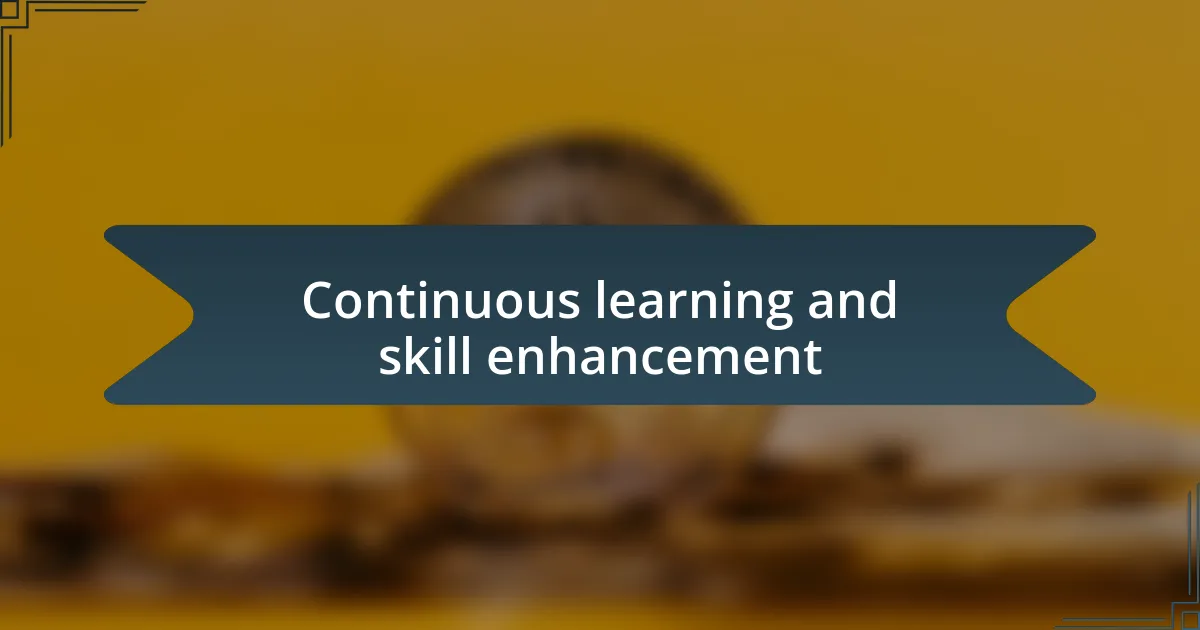
Continuous learning and skill enhancement
Continuous learning is essential in the ever-evolving field of blockchain development. I remember when I first encountered decentralized finance (DeFi) concepts; it was challenging, but immersing myself in online courses and forums reignited my passion. Have you ever delved into a topic that seemed overwhelming at first, only to find a treasure trove of knowledge that transformed your understanding?
Skill enhancement doesn’t just come from formal education; it also stems from active participation in online communities and hackathons. I joined a local blockchain meetup group where we worked on real projects together. Collaborating with others not only enriched my technical abilities but also allowed me to build a network of like-minded individuals. It’s incredible how learning in a group can inspire you and push you to tackle challenges you might have avoided alone.
I find that keeping up with industry news is just as crucial as hands-on practice. Subscribing to relevant blogs and following key figures on social media has opened my eyes to trends and innovations I wouldn’t have discovered otherwise. The thrill of learning something new each day keeps my enthusiasm alive. What resources do you rely on to stay informed about the latest developments in blockchain?


